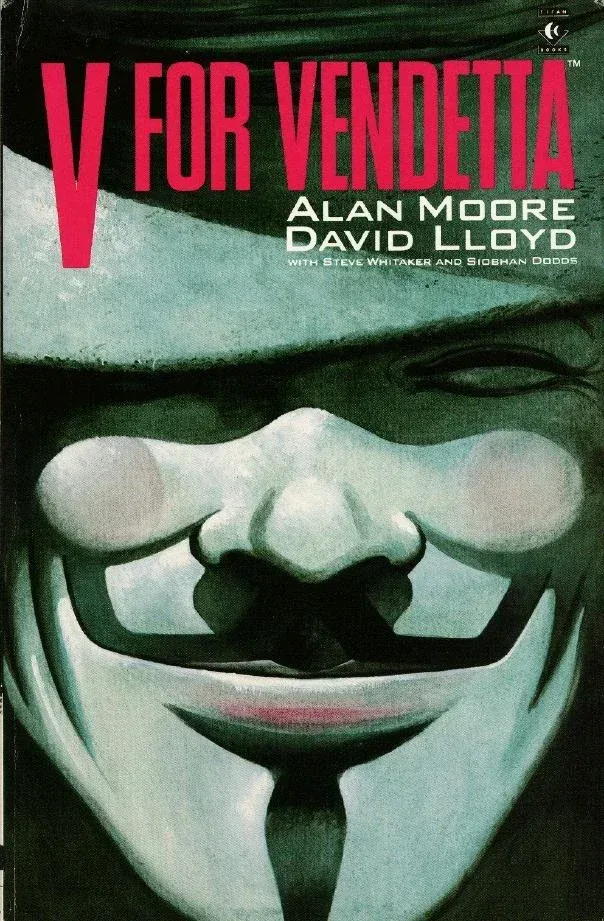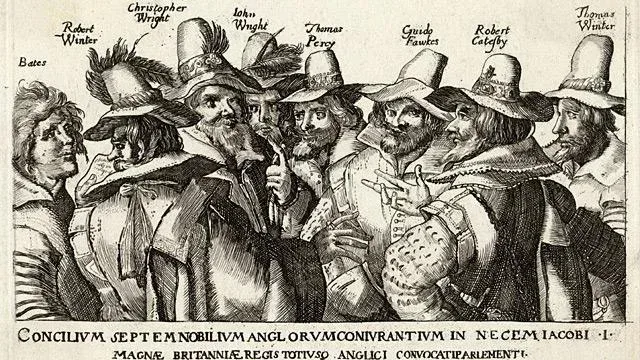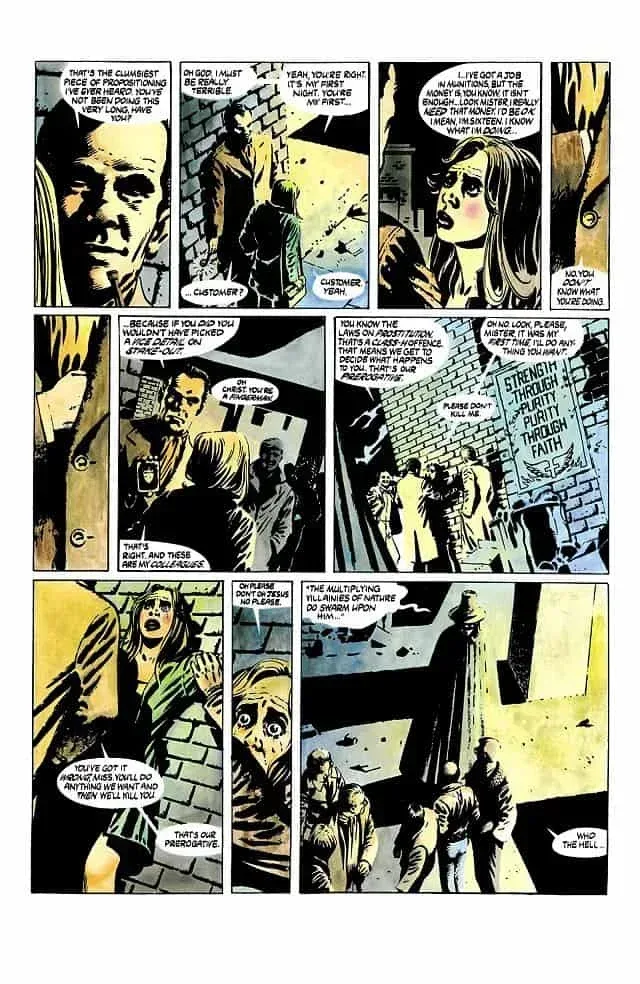
Ten amazing issues published between 1982 and 1989. The super talented Alan Moore. And one epic comic book anti-hero called simply – V. That is the legacy of V for Vendetta, one of the best comic books in modern history and a story that has been influential on so many levels. In today’s article, I discuss the historical background behind this comic and the meaning of the famous phrase “Remember, remember, the 5th of November.”
On November 5, 1605, English revolutionary Guy Fawkes tried to blow up the House of Lord as part of the Gunpowder Plot. He was stopped, but this anarcho-revolutionary attempt is still celebrated by many as Guy Fawkes Night, and it inspired Moore’s famous comic book.
In today’s article, I am going to lead you through the history that inspired Alan Moore’s cult classic comic V for Vendetta. You’re going to find out why November 5th is so special and what exactly happened on that date in history. You’re also going to find out the meaning of the famous rhyme referring to that date. It’s going to be informative so prepare yourselves and enjoy!
What happened on the 5th of November?
The answer to this question takes us back to 1605 and the (in)famous Gunpowder Plot. Namely, a group of plotters decided to assassinate the then-English king, James I, by blowing up the House of Lords on the State Opening of Parliament, which happened on November 5, 1605. The plot was led by Robert Catesby and consisted of a group of provincial English Catholics who wanted to get rid of James I in favor of his daughter, Elizabeth, who would become England’s new Catholic monarch.
The plotters managed to smuggle 36 barrels of gunpowder (hence the name – Gunpowder Plot) into the undercroft of the House of Lords. That was enough gunpowder to completely destroy the whole building.
An anonymous letter was sent to William Parker on October 26, 1605, which revealed the existence of a plot. On November 4, 1605, the guards searched the building and found Guy Fawkes (also known by his Italian nickname Guido) guarding what seemed to be firewood in the House’s undercroft. Fawkes said that the material belonged to his master and left the building along with the guards. He would later return while the guards reported to the King.
The King ordered a more thorough search of the undercroft and the guards returned, finding Fawkes once more on guard duty. He was arrested this time and the guards soon discovered that he was guarding the gunpowder with which he was to blow up the House of Lords.
The Gunpowder Plot was thus discovered and stopped before it even began. Fawkes was arrested to be later executed. He actually leapt to his death to avoid punishment and died from a broken neck. The other plotters fled from London; some of them were later caught and killed, but the complete scope of the plot was never discovered.

Why is the 5th of November so special?
Aside from its historical importance, the 5th of November is a date that carries strong symbolism in pop culture, mainly thanks to Alan Moore’s v for Vendetta.
This comic book carries several strong connections to the Gunpowder Plot. The story begins on Guy Fawkes Day (November 5) and has the titular antihero, V, hidden behind a so-called “Guy Fawkes Mask”. The mask is today a strong symbol of rebellion in popular culture and even the hacktivist group Anonymous uses these masks as part of their attire.
But the date carries an even deeper symbolical meaning. Guy Fawkes, although initially labeled as a traitor and executed, has since become a symbol of rebellion against a tyrannical government. The Gunpowder Plot, although it had its ideological reasons, which were mostly of a religious nature, was a manifestation of the people’s right to dispose of an unwanted ruler. The historical context is much less idealistic than is interpreted in popular culture, but Moore made a nice twist to the whole idea.
Namely, Alan Moore juxtaposes a totalitarian state, a fascist state, to a radical, anarchistic individual. James I wasn’t a fascist and the English Monarchy of the 16th and early 17th centuries was far from being totalitarian and even farther from being fascist, but it was a state which had an oppressed group of people that had the right to self-determination. Whether blowing up Parliament was the right way to do so is a question for historians, but Moore gave it a nice, symbolic interpretation.
Moore used the Cold War as an inspiration and the often-heard accusations that Margaret Thatcher was actually a fascist. She wasn’t, of course, but Moore intentionally exaggerated the justified criticisms of her rule and compared her conservative policies to a fascist state. It was Thatcherism that was embodied in the fascist rule of Moore’s dystopian state.
On the other side of the ring was V, a humanist, but also a radical and an anarchist. As an artist, Moore decided to juxtapose to completely polar opposites – a firm, merciless fascist state on one side, and an embodiment of stateless anarchism on the other. V wasn’t a moral absolutist like Rorschach from Moore’s Watchmen, he was much more of a humanist and he cared much more, but he realized that the only way to destroy such a corrupt government was to violently dispose of it.
And that is the special meaning of the date; Moore drew parallels between Cold War Britain and the Fawkes plot, between control and freedom and he used probably the most famous date in British history to construct his plot.

What is the 5th of November rhyme?
The Gunpowder Plot was an inspiration for artists ever since the 17th century and while Moore is probably my favorite interpreter of these historical events, he is certainly not the only one. The poet Milton wrote “In Quintum Novembris” (“On the Fifth of November”), in 1626. I heard the first line of this poem thousands of times during my childhood in the UK – it even became part of a safety warning campaign on television, specifically aimed at those that took part in Guy Fawkes firework celebrations.
The rhyme, also used in Moore’s comic book, goes as follows:
Remember, remember the Fifth of November,
The Gunpowder Treason and Plot,
I know of no reason
Why the Gunpowder Treason
Should ever be forgot.
Guy Fawkes, Guy Fawkes, t’was his intent
To blow up the King and Parli’ment.
Three-score barrels of powder below,
Poor old England to overthrow;
By God’s providence he was catch’d (or by God’s mercy*)
With a dark lantern and burning match.
Holla boys, Holla boys, let the bells ring.
Holloa boys, holloa boys, God save the King!
And what should we do with him? Burn him!
This rhyme was just a reminder of what had happened on that day in 1605. It is now considered to be a traditional rhyme and is even indexed (number 16916) in the Round Folk Song Index.

